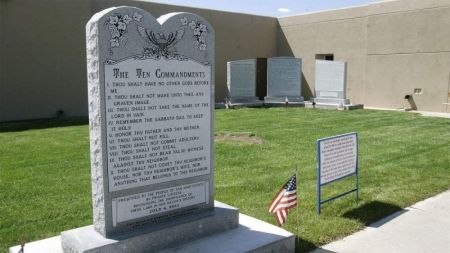NM Ten Commandments Display Unconstitutional, Supreme Court Affirms in Declining Case

The United States Supreme Court has declined to hear an appeal in a case regarding a Ten Commandments display on public property in New Mexico, thus allowing a lower court ruling against the display to stand.
On Monday morning the highest court in the land issued an order list in which it declined without offering comment to hear the appeal in City of Bloomfield, New Mexico v. Felix.
The Alliance Defending Freedom, which was helping to represent Bloomfield, released a statement Monday morning denouncing the Court's refusal to hear the appeal.
"Just because we disagree with what something says, does not mean we can ban it from the public square," stated the ADF.
"But by allowing the Tenth Circuit decision to stand, the Supreme Court has given anti-religion advocates a license to challenge any monument that they see and offends them."
A six-foot tall Ten Commandments display weighing approximately 3,000 pounds was erected at the city hall in Bloomfield in July 2011.
In 2012, the New Mexico chapter of the American Civil Liberties Union filed a lawsuit against the city of Bloomfield regarding a Ten Commandments display on their city hall property.
The ACLU filed the suit on behalf of Jane Felix and B.N. Coone, two pagan residents of Bloomfield who took issue with the Ten Commandments' placement on government property.
In Aug. 2014, U.S. District Court Judge James Parker ruled that Bloomfield City Hall must remove the display, saying that it violated the Establishment Clause of the First Amendment.
"The Ten Commandments monument is government speech regulated by the Establishment Clause because the Ten Commandments monument is a permanent object located on government property and it is not part of a designated public forum open to all on equal terms," wrote Judge Parker.
"In view of the circumstances surrounding the context, history, and purpose of the Ten Commandments monument, it is clear that the city of Bloomfield has violated the Establishment Clause because its conduct in authorizing the continued display of the monument on city property has had the primary or principal effect of endorsing religion."
In Nov. 2016, the Tenth Circuit Court of Appeals affirmed the lower court decision, with ACLU of New Mexico Executive Director Peter Simonson saying in a statement that his group was "pleased" with the ruling.
"Religious belief and practice is an important part of the lives of many New Mexicans, and we fully support the right of individuals and organizations to create religious displays on private property," stated Simonson.
"However, the City of Bloomfield shouldn't be in the business of deciding which set of beliefs should be favored from among the diverse religious traditions and beliefs held by its citizens."
Bloomfield appealed to the Supreme Court, receiving many amicus briefs in support of their position to keep the Ten Commandments display on government property.
One brief in support was filed in August by several members of Congress, including Senator Ted Cruz of Texas, Senator Orrin Hatch of Utah, and Congressman Steve King of Iowa.
"The [Tenth Circuit's decision] highlights the confusion in the lower courts about the meaning of the Establishment Clause," read the brief's conclusion.
"It also highlights the need for this Court to reaffirm that offended-observer standing is inconsistent with the requirements of Article III. For both of these reasons, this Court should grant the petition and reverse the decision of the Tenth Circuit."





















